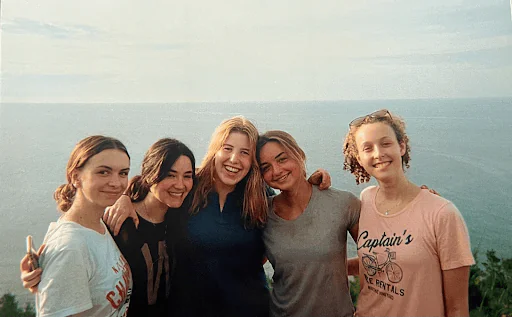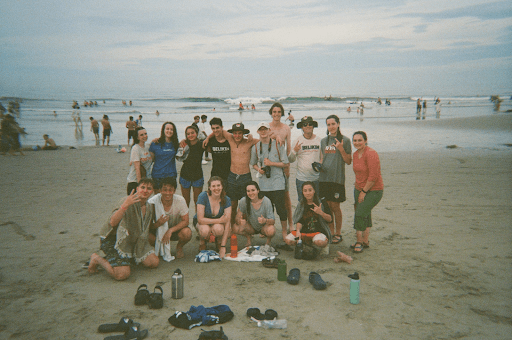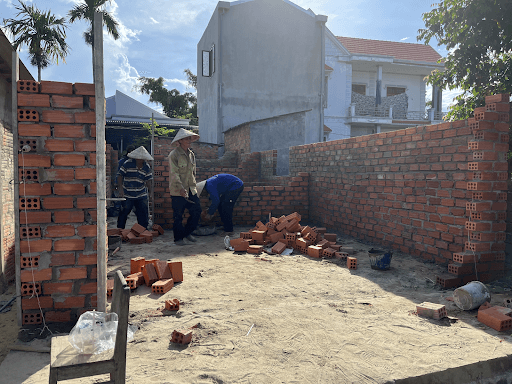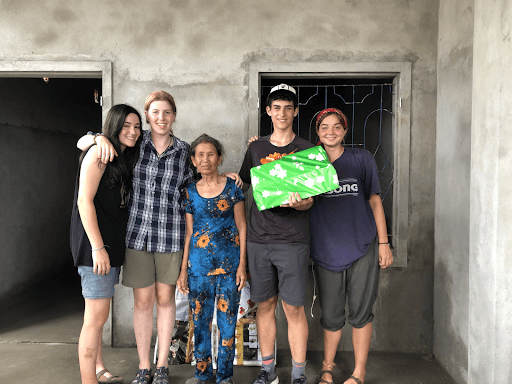
Annabel (second from right) with friends in Vietnam
Annabel is an alum of our Service Vietnam program (2022). Since her program, she and her family have become involved in fundraising efforts to support the Stream of Holly Cross Children’s Home in Jinja Province, Uganda. In this interview, hear in her own words about the impact of her Vietnam service experience on her personal journey and perspective, and her ongoing motivation to contribute positively to the global community.
Can you share a bit about yourself?
I am currently a senior in high school. My short term future plans will hopefully involve attending college with a potential gap year thrown in there as well. I love spending time outdoors, and this winter I have enjoyed skiing (cross country, backcountry and downhill), as well as weekly cold plunges to add a bit of a thrill to these long winter months. This spring I’m looking forward to yet another great Ultimate Frisbee season, hiking, biking, and countless other adventures.
What were some highlights of your experience on the Vietnam service program?
I can say without question that the highlights of my experience in Vietnam were all unexpected. First and foremost were the people I got to spend four amazing weeks with! Nearly all of my happiest memories were a result of the time I spent with my amazing fellow Putney travelers, and with our new friends from the local Communist Youth Union. Any minor challenges along the way only heightened the constant excitement and thrill of being in a new place, with new people, having the time of our lives!

The whole group at the beach. A daily routine.
How did your time in Vietnam shape your understanding and connection with the local culture and people?
One of the many joys of the program was realizing the impact of my presence, as insignificant as I had assumed it to be, bringing smiles to the faces of other people. There really is no better way to understand a new place and people than by spending time with them, and not in a touristic manner. Putney really stresses the idea of being travelers and not tourists. Becoming a traveler meant finding meaningful ways to connect and contribute to the people I met and the places we visited. I really benefited from the opportunities to work with locals, whether that meant cleaning beaches, teaching English, playing tug of war, or doing construction. Prior to the trip, as an American on my way to Vietnam, I was slightly apprehensive of how we may be received in some places given the role of the US in the “Vietnam War”, or as they call it there the “American War.” Never once did we encounter hostility. In fact, I couldn’t have asked for a more generous or welcoming community.
How do you think your Putney experience has impacted your perspectives?
Traveling abroad, forging friendships, and making connections with people who are literally half the world away gives me hope for our future. I think it is easy to fall into despair given the challenges my generation has yet to face. Since my time in Vietnam, it has really sunk in that in a world full of people, we are just one big community. National pride is a force to be reckoned with, and we sometimes fail to see the humanity that can be so easily masked by nationalism. I believe that the necessary reconciliation we need to begin perpetuating “we,” as a united international community, is by deconstructing the idea of “we” versus “them.” My experience in Vietnam allowed me to witness so many younger leaders ready to rise to occasion and cultivate hope!

The construction site in Vietnam where the group worked
Did the program shape your future plans or impact your personal journey?
I plan to further my education, concentrating on international relations and diplomacy, with a potential additional focus on conservation of natural resources. Putney put a bug in me to see as much of the world as possible. I associate much of my motivation to continue down this path with the many collaborative experiences in Vietnam. I remember the joy and surprise I felt working effectively and efficiently alongside local people in spite of language barriers and our individual differences.
Can you share how your time in Vietnam is linked to your philanthropic work with children in Uganda?
I chose to go to Vietnam for two reasons: it was the furthest away from home, and it was a service program. The service aspect of the trip was very important to me. As I mentioned previously, I knew that I wanted the opportunity to engage with a place and its people, in order to gain more than just a surface-level experience from my time spent abroad. The connection we have built as a family to the Children’s Home in Uganda presents a similar opportunity to engage a challenge, with the intended outcome being to better the lives of others.
Are there moments from these experiences that have left a lasting impression on you?
In Vietnam, the finale to our time spent constructing homes for three families was a gifting ceremony during which the families were presented with official paperwork designating them homeowners. My site was home to an elderly couple. The elderly woman often watched us work from the shade of her then-home, adjacent to the site of the new one. At the gifting ceremony she approached me, and embraced me. Translated through one of our local friends, the woman told me how grateful she was and how she admired my strength! This tender gesture made me tear up. I think about this woman often, about the impression we both clearly had on each other, and that I’ll likely never see her again.

Annabel and fellow Putney students with the recipient of the new home
How has your father’s work at the Interaction Institute for Social Change influenced your journey and commitment to social causes?
Growing up, my parents both put a lot of effort into teaching my sisters and I the importance of making an effort for the sake of others. They have encouraged us to be independent and hard working. My dad’s work has exposed us to topics of race, food systems, climate change, and how all these issues are connected. Dinner table conversations often revolve around such topics. I’ve always enjoyed engaging in discussions to better understand the root of current issues. I’ve always admired my dads dedication to bringing people together and formulating innovative solutions to such complex problems.
Can you tell us more about how your connection with the Children’s Home in Uganda was established, the work you’re currently doing there, and the impact you’ve had?
My family and I became involved with the Children’s Home in Uganda when Kyelu Tadeo, the man running the Stream of Holy Cross Children’s Home, reached out via LinkedIn. He had discovered my dad through connections to my dad’s work as an organization development consultant (at the Interaction Institute for Social Change). After confirming the legitimacy of Kyelu’s establishment, my family donated to the Home’s funds for food and clothing. Over the holidays we set up the GoFundMe and raised $1,000 USD (the monthly cost of caring for thirty orphans) with the help of our extended family and friends. Since meeting that goal, we have started raising further funds on a new campaign.
Can you share some details about the project and how funds raised will be utilized?
Kyelu and other staff of the Children’s Home care for thirty or so orphans ranging in age from 5-18 years. Most children have lost their parents to the HIV/AIDS epidemic. Political unrest in Uganda has led to some parents’ loss of life due to violence between political parties. Additionally, high levels of poverty can result in malnutrition, parental neglect, early pregnancies, substance abuse, high rates of illiteracy, and early death from preventable diseases like cholera, malaria, TB, and typhoid among others.
Stream of Holly Cross Children’s Home was founded in April 2013 in Jinga Mafubira, Uganda. It created a refuge for children from all across Uganda. Kyelu shared his proposal with my family. He hopes to purchase land as opposed to renting, which he is currently doing, and which is expensive. The mission of the Children’s Home is to provide education, health care, and community to children who have lost their families. This would in turn help to cut down on the number of street children and child-related crime in the area, reduce HIV/AIDS cases through education and prevention, improve access to education, and help children acquire technical skills regardless of their academic inclination, in order to support themselves in the future.
Funds from this project will go to supporting the Home’s cause. Purchasing land to grow crops like maize, cabbage, potatoes, bananas, avocados, citrus, raising poultry, and becoming self reliant. Building a larger facility equipped with a library, separate dormitories, computers, a small medical clinic and volunteer wing, among other amenities.
Click here to see the campaign and contribute.
Click here to learn more about Putney’s approach to service learning.







